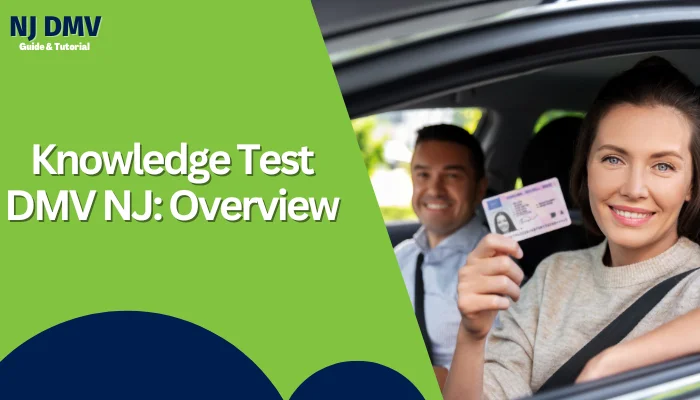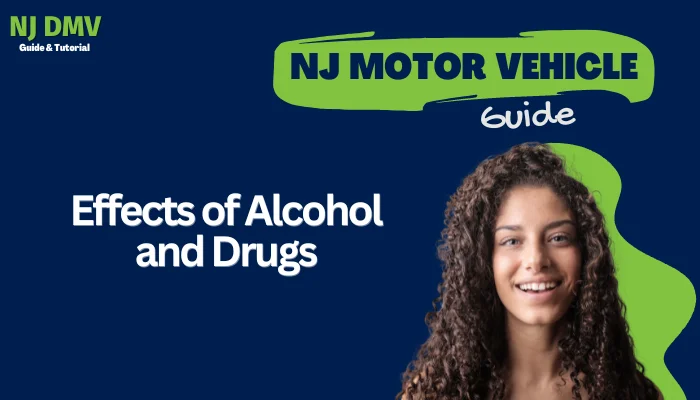The knowledge test DMV NJ is an important requirement for acquiring driving licenses in New Jersey. This NJ DMV exam tests your knowledge of the State’s road regulations, traffic signs and safe driving principles, thus ensuring that all drivers have the necessary understanding to operate vehicles safely.

It is mandatory for one to pass this test whether you are applying for the first time or renewing your license. Today, we will know in detail about knowledge test NJ DMV.

Knowledge Test DMV NJ: Overview
The knowledge test DMV NJ ensures that there are no drivers on public roads who do not understand and follow rules. By passing this test, motorists show their ability to:
- Choose well-informed judgments about how they drive.
- Know street instructions
- Adhere to rules governing movement of vehicles.
Road safety cannot be compromised upon hence making the knowledge test vital in its promotion.
The number of accidents caused due to ignorance of these traffic laws and road signs can be reduced by informing drivers adequately through testing them.
Further still, a driver’s license cannot be issued without undertaking a knowledge test DMV NJ. Without passing this examination you cannot proceed with licensing process.
Due to this, it is important to take the examination seriously and prepare adequately in order to get successful results.
When Taking a Knowledge Test DMV NJ?
On the day of your knowledge test DMV NJ, ensure that you arrive at the DMV office early enough not to rush. Make sure that you have all the required documents such as:
- Identification documents
- Proof of residency
- Social security number
The test will not be allowed if any of these documents is lacking.
Generally, knowledge test contains multiple-choice questions. To be able to manage your time properly since there is an allocated duration for this test:
- Read each question carefully.
- Eliminate answers that are clearly wrong.
- Increase chances of picking the right one.
Don’t give up when you do not succeed on your first trial of passing a knowledge test DMV NJ. After some specified waiting time period, one has another opportunity for taking it once more again.
Spend this time revising and doing extra practice tests hence improving on your understanding as well as confidence levels.
Familiar Topics Tested in the Knowledge Test DMV NJ
The knowledge test covers a wide range of topics essential for safe driving. Some common topics include:
- Road Signs: Understanding different types like regulatory signs, warning signs or informational boards used by road users.
- Traffic Laws: Understanding specific state’s traffic rules plus regulations.
- Driving Rules: Safe driving practices like using turn signals, maintaining a proper distance following the car ahead and adhering to speed limits among others.
- Emergency Situations: What to do in situations of emergencies, such as breakdowns, accidents, and extreme weather conditions.
- Alcohol and Drug Impairment: The effects of alcohol and drugs on driving ability and the legal consequences of driving under the influence.
It is important to familiarize yourself with these subjects so that when you take a knowledge test DMV NJ, you will have no difficulties. All these aspects are essential for providing safe driving solutions to different scenarios faced by drivers.
Road Signs in the Knowledge Test
Road signs play a significant role in the knowledge test DMV NJ. They communicate necessary information to drivers while ensuring smooth flow of traffic. These can be classified into three main groups:
Regulatory Signs
This group includes:
- Stop signs
- Yield signs
- Speed limit signs
These inform drivers about various traffic laws/rules that they must follow/observe. Understanding these points is vital for passing your knowledge test at DMV NJ as well as being a safe driver.
Warning Signs
These tell-tale cards indicate potential dangers like:
- Sharp curves ahead
- Pedestrian crossing
- Construction areas
It helps knowing them since it will enable one to make adequate preparation for the changing conditions on road.
Informational Signs
Informational boards provide useful data such as:
- Distance before a place is reached
- Points of interest
- Highway exits
One therefore needs to understand them well especially if you are not familiar with an area.
To pass the knowledge test, you should study and memorize various road symbols. Also try identifying these indicators during real-life drive scenarios for reinforcement purposes of what you already know now.
Traffic Laws in the Knowledge Test DMV NJ
Traffic laws are another critical component of the knowledge test DMV NJ. They regulate driver behavior on roads and ensure safety for all road users. You need to understand some key traffic laws such as:
- Speed Limits: It is important to understand the consequences of speeding and various speed limits. Different areas like residential areas, highways or school zones have specific speed limits to be followed.
- Right-of-Way Rules: These rules determine who has the right of way in different traffic circumstances. Knowing when to stop and when to go is vital in preventing accidents.
- Seat Belt Laws: According to New Jersey law, all passengers must wear seat belts. You should learn them since there are penalties for breaking such a rule.
- Cell Phone Use: You cannot use your phone when driving unless you are using a hands-free device. This is an important law that you must know and its exemptions in order for you not to have any troubles while driving.
If one carefully studies these traffic regulations, then they will be ready enough for answering any related queries during the knowledge test DMV NJ.
Driving Rules in the Knowledge Test
Driving rules include safe operating practices and techniques that ensure safety of all road users. These principles are assessed in the knowledge test including:
- Safe Following Distance: One can avoid crashing into other cars if he/she maintains sufficient gap between his/her vehicle and another ahead of it. A common recommendation for figuring out this distance is by using “three-second rule“.
- Proper Use of Turn Signals: Use of turn signals can assist in averting accidents by showing other drivers what you want to do next with your car. Study how properly these signs should be used while turning or changing lanes on roads beforehand.
- Obeying Traffic Signals: One must be aware of the traffic signals such as red lights, green lights and flashing lights when approaching intersections in order to navigate safely.
- Yielding to Emergency Vehicles: Responding appropriately when emergency vehicles approach with their sirens blaring and emergency lights flashing is important in order to ensure their fast passage through the area and maintain safety on road.
It will also be helpful for you if you check these driving rules during real-life situations so that you can pass the knowledge test DMV NJ well.
Handling Emergency Situations
Also, the knowledge test evaluates whether you can handle emergencies or not. It is very important to be ready for possible emergencies that may lead to your life and lives of other people taken away. These are some of them:
Vehicle Breakdowns
What actions should be taken when a vehicle breaks down, including:
- Where to park it safely?
- How to alert other drivers?
- What number you should dial?
Accidents
The proper steps to take after a car crash include:
- Checking for injuries
- Calling for help
- Exchanging information with other drivers involved.
Adverse Weather Conditions
Rain, snow or fog require special precautions while driving. Learn how to drive safely under such conditions.
Preparing yourself during such situations helps a person not only excel in the knowledge test, but also face any real-life cases of accidents while on roads.

Effects of Alcohol and Drugs
The effects that alcohol and drugs have on driving ability are assessed by this part of the knowledge test. Driving under influence affects your:
- Judgment
- Coordination
- Reaction time
Thus increasing chances of accidents happening. The main points that need attention include:
Legal Consequences
New Jersey has strict penalties for DUI. Get familiar with the BAC limits that are legal and the sanctions of breaking this law.
Recognizing Impairment
Understand how alcohol and other drugs affect your body and mind while driving. Awareness of these impacts can assist you in making right decisions.
Zero Tolerance for Underage Drivers
In New Jersey, if you are under 21, there is no drinking allowed at all. What does this policy mean to young people?
This knowledge will help you answer questions on drug use and alcohol impairment in the knowledge test DMV NJ more confidently.
Resources for the Knowledge Test NJ DMV
Different resources can be used during preparation for the knowledge test DMV NJ. Make good use of such options as they will help you revise well thus giving higher chances of succeeding in the examination. Some resources include:
- New Jersey Driver Manual: Your first resource should be the official New Jersey Driver Manual. It contains all relevant subjects such as traffic rules, road signs and safety driving techniques.
- Online Practice Tests: There are many websites offering free practice tests specific to knowledge test. These tests are designed like real test papers thereby helping you become familiar with format and types of questions on them.
- DMV Website: The New Jersey’s Department of Motor Vehicles website gives you the vital information like test locations, scheduling and requirements. Make sure to check the site regularly for updates and additional resources.
- Study Guides and Apps: There are different study guides and mobile applications that can help you get ready for the test. These resources come with interactive features such as flashcards and quizzes to solidify your understanding.
- Driving Schools: Driving schools have personalized instruction, as well as extra materials, which will assist you in preparing for a knowledge test. Many driving schools provide special courses aimed at passing the knowledge test.
By using these resources, you will have a comprehensive study plan that will guarantee success on your knowledge test DMV NJ.
Scheduling the Knowledge Test DMV NJ
Scheduling is an important step of taking knowledge test so that you can acquire a license. Here are some steps to follow:
- Check Eligibility: Ensure your eligibility for taking this examination including age, residency and identification requirements.
- Gather Required Documents: Store up all required papers like identity proof, resident documents and social security number proofs. Ensure current dates are used while preparing these documents.
- Schedule an Appointment: Visit New Jersey’s Department of Motor Vehicle website where appointments can be made for a knowledge test . Appointments are often necessary so make arrangements in advance to secure yourself good timing.
- Confirm Test Location: Make sure you know where your testing location is before going there. In order to avoid any last minute stress it is advisable that you go early on the day of the actual examination.
By following these steps, one will be well prepared to schedule and take their knowledge test DMV NJ effectively.
What to Expect After Passing the Knowledge Test?
After passing through the knowledge test DMV NJ, much more has yet to be done about licensing process completion. What happens next is as follow:
- Obtain a Learner’s Permit: Once you pass the knowledge test, you are given a learner’s permit. This permit allows you to drive under certain conditions and with a licensed driver.
- Complete Driver’s Education: If applicable, enroll in driver’s education for more information and practice driving skills. Most often young drivers have to take these courses.
- Schedule the Road Test: Once your practice hours and driver’s education requirements are fulfilled, you can book yourself for a road test. This will evaluate how well you can apply what you have learned into practical situations on the road by driving; it represents the final step in getting your license.
- Continue Practicing: Even if after passing the knowledge test, please continue practicing safe driving habits. The more experience one gains as time goes by, the better he/she becomes at driving.
By understanding what happens after passing the knowledge test DMV NJ, one is able to be fully prepared to complete licensing process and become responsible driver.
Conclusion
A knowledge test DMV NJ is an imperative stage towards getting a driving license in New Jersey. By extensively preparing for the exams, being familiar with the subject matter covered and using available resources, chances of success can be enhanced.
Remember this examination is important as far as road safety is concerned because it ensures that one is a responsible driver once they hit the roads. Best of luck!
Contents
- Knowledge Test DMV NJ: Overview
- When Taking a Knowledge Test DMV NJ?
- Familiar Topics Tested in the Knowledge Test DMV NJ
- Road Signs in the Knowledge Test
- Traffic Laws in the Knowledge Test DMV NJ
- Driving Rules in the Knowledge Test
- Handling Emergency Situations
- Effects of Alcohol and Drugs
- Resources for the Knowledge Test NJ DMV
- Scheduling the Knowledge Test DMV NJ
- What to Expect After Passing the Knowledge Test?
- Conclusion
